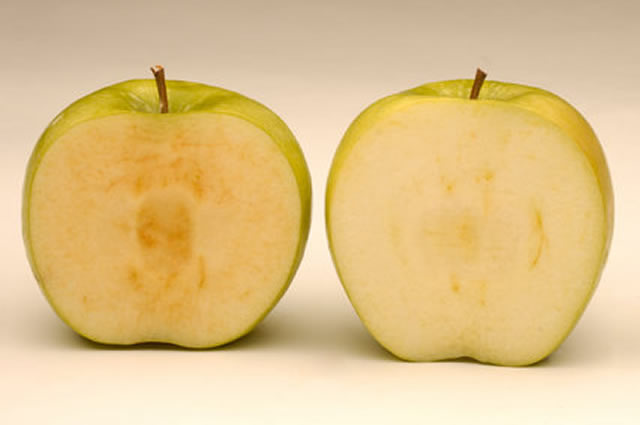USDA Approves World’s First GMO Apples

Scientists, environmental and consumer groups have decried USDA’s approval of two ‘Arctic’ apple varieties, while major food companies and apple growers have no plans to source or grow them – despite their potential to ‘generate consumer excitement in the apple category.’
Arctic apples offer lower shrinkage and the related savings, while a whole new line of improved apple products will generate consumer excitement in the apple category.
The US Department of Agriculture has ‘deregulated’ two varieties of Arctic® apple, the world’s first genetically engineered apple produced by Canadian corporation Okanagan Specialty Fruits.
The USDA’s deregulation technically allows ‘Arctic Granny’ and ‘Arctic Golden’ apples to be planted and sold without specific oversight, although the FDA may engage Okanagan in a voluntary safety consultation process prior to the GMO apple being available in the US.
According to Okanagan, the apples will be labeled as ‘Arctic’, but will not be labeled as genetically engineered.
Despite this approval, a number of major food companies including McDonald’s and Gerber, Nestle’s baby food brand, have already stated that they have no plans to source or sell this genetically engineered apple.
The same goes for major apple growing associations, including USApple and the Northwest Horticultural Council – which represents Washington state apple growers who grow more than 60% of the US apple crop – that have stated opposition to this GMO apple.
Lisa Archer, Food and Technology program director at Friends of the Earth, was among those who decried USDA’s “flawed approval” of the GMO apple. “There is no place in the US or global market for genetically engineered apples”, she said.
“Farmers don’t want to grow it, food companies don’t want to sell it and consumers don’t want to eat it.”
Watch whose RNA you’re interfering with!
The purported advantage of the Arctic apple is that it does not ‘brown’ when exposed to air, because the enymes that catalyse the natural browning process have been diasabled.
To achieve this the apple is genetically engineered via a new, virtually untested experimental technique called RNA interference (RNAi), to ‘silence’ the genes that express the enzymes.
But many scientists fear that the lack of these enzymes may have negative, unintended impacts on human health and the environment, in a number of ways. Without natural browning, apples may look fresh when they are actually decaying.
“We are concerned that USDA’s safety evaluation of this apple was inadequate, particularly with regard to the health and environmental implications of this particular RNAi technology”, says Dr. Michael Hansen, senior scientist at Consumers Union.
The natural browning enzyme in apples may also help to fight diseases and pests, meaning that famers may have to increase their pesticide use on these new GMO apples. Conventional, non-GMO apples already carry some of the highest levels of toxic pesticide residues, many of them linked to hormone disruption, reproductive harm and ADHD.
Another scientific concern, adds Archer, is that while Okanagan’s RNAi process aims to silence four of the apple’s genes, the process “may be dangerously imprecise.” Targeted gene sequences are similar to other closely related genes, so the silencing process “could unintentionally impact genes that affect other functions in the plant.”
“Okanagan’s petition for deregulation also does not adequately analyze the other potential functions that the targeted gene sequence could have, other than browning in apples, nor does it address the risk of unintentionally silencing the non-targeted genes. It is unclear how the USDA evaluates the risks from gene silencing and other powerful new biotechnologies.”
GMO pollen could contaminate apple crops, and seeds
If grown commercially, organic and conventional farms also face risks of contamination from neighboring GMO apple groves.
